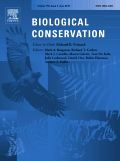
BIOLOGICAL CONSERVATION
Scope & Guideline
Elevating Conservation Efforts with High-Impact Findings.
Introduction
Aims and Scopes
- Biodiversity Assessment and Monitoring:
The journal publishes research on methodologies for assessing biodiversity, including species distribution, population dynamics, and the impacts of conservation measures on species and ecosystems. - Conservation Strategies and Policies:
Papers often explore the effectiveness of various conservation strategies, including protected area management, community-based conservation, and policy frameworks that support biodiversity. - Ecological Restoration and Management:
Research on ecological restoration practices, including habitat rehabilitation, species reintroduction, and the management of invasive species, is a consistent focus. - Human-Wildlife Interactions:
The journal addresses the complexities of human-wildlife interactions, including conflict resolution and the socio-economic factors influencing conservation outcomes. - Climate Change and Conservation:
Studies examining the impact of climate change on biodiversity and the development of adaptive management strategies are prevalent, reflecting the urgent need for conservation in a changing environment. - Ethics and Conservation:
An emphasis on ethical considerations in conservation practices, including the role of indigenous knowledge and the implications of conservation actions on local communities.
Trending and Emerging
- Community-Based Conservation:
There is a growing trend towards research that emphasizes community engagement and the role of local stakeholders in conservation efforts, highlighting the importance of social dimensions in biodiversity management. - Integrative Conservation Approaches:
Emerging themes include integrative conservation strategies that blend ecological, social, and economic perspectives, reflecting a shift towards holistic solutions for complex conservation challenges. - Climate Adaptation Strategies:
Research on adaptation strategies to mitigate the effects of climate change on biodiversity is increasingly prevalent, underlining the urgent need for proactive conservation measures. - Technological Innovations in Conservation:
The use of technology, such as remote sensing, eDNA analysis, and machine learning, is gaining traction in conservation research, facilitating more effective monitoring and management practices. - Cultural and Ethical Dimensions of Conservation:
Emerging studies are focusing on the ethical implications of conservation practices, including the integration of indigenous knowledge and values, which are becoming central to contemporary conservation discussions. - Urban Biodiversity and Green Spaces:
Research examining biodiversity in urban environments and the role of green spaces in promoting wildlife conservation is trending, reflecting global urbanization patterns and their ecological implications.
Declining or Waning
- Species-Specific Conservation:
There appears to be a waning emphasis on species-specific conservation efforts, as more research is directed towards ecosystem-wide approaches and the conservation of functional groups rather than individual species. - Traditional Ex Situ Conservation:
Studies focusing on traditional ex situ conservation methods, such as captive breeding, have become less prominent as the field shifts towards more integrative and landscape-level conservation strategies. - Single-Species Management:
Research concentrating solely on single-species management has decreased, with a growing recognition of the need for holistic approaches that consider ecological interactions and community dynamics. - Invasive Species Management:
While still important, the frequency of papers specifically targeting invasive species management has declined as conservation strategies increasingly incorporate broader ecological frameworks. - Biodiversity Offsetting:
The concept of biodiversity offsetting, once a significant focus, has seen reduced attention as critiques of its effectiveness and ethical implications have emerged, leading to calls for more sustainable and integrated conservation practices.
Similar Journals
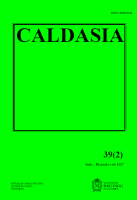
CALDASIA
Cultivating Research to Nourish the WorldCALDASIA is a distinguished open-access journal dedicated to the field of Agricultural and Biological Sciences, published by INST CIENCIAS NATURALES, MUSEO HISTORIA NATURAL since its inception in 1981. Based in Colombia, this journal plays a pivotal role in disseminating scientific knowledge and fostering research collaboration across the globe. With a focus on diverse subjects within the biological sciences, CALDASIA aims to bridge gaps in research and support scholars, professionals, and students in advancing their work. With a 2023 Scopus Ranking of #132 out of 221 in its category, representing a 40th percentile ranking, it holds a solid position in the academic community, particularly recognized for its contributions to miscellaneous areas within agricultural and biological sciences. The journal remains committed to enhancing accessibility, as evidenced by its open-access policy since 2001, thereby ensuring that research findings reach a wider audience without barriers. For those returning to this vibrant field, CALDASIA serves as an essential resource for contemporary findings and discussions that shape environmental and biological scholarship.

Floresta e Ambiente
Exploring the ecological significance of forests worldwide.Floresta e Ambiente is a pioneering open-access journal dedicated to advancing knowledge in forestry and environmental science, published by the Federal Rural University of Rio de Janeiro's Institute of Forests. Since its inception in 2012, this journal has emerged as a crucial platform for researchers, professionals, and students to disseminate innovative findings and foster discussions on sustainable forest management, conservation practices, and the ecological significance of forests in Brazil and beyond. With an impressive impact factor and a commendable ranking in the SCOPUS database, positioned in the 49th percentile of the Agricultural and Biological Sciences category, Floresta e Ambiente actively supports the dissemination of high-quality research while contributing to the global discourse on forestry. As an open access journal since 2013, it ensures that valuable knowledge is readily available to all, enhancing collaboration and engagement within the scientific community.
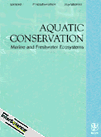
AQUATIC CONSERVATION-MARINE AND FRESHWATER ECOSYSTEMS
Advancing aquatic knowledge for a sustainable future.AQUATIC CONSERVATION-MARINE AND FRESHWATER ECOSYSTEMS, published by WILEY, is a premier international journal dedicated to advancing the understanding of aquatic ecosystems and their conservation. With an impact factor reflecting its significant influence and a distinguished position in the Q1 quartile across key categories such as Aquatic Science, Ecology, and Nature and Landscape Conservation, this journal serves as an essential resource for researchers and professionals engaged in the study and protection of marine and freshwater environments. Covering a broad array of topics, from ecosystem management to conservation strategies, the journal encourages the dissemination of innovative research and interdisciplinary perspectives. Although it is not an open-access publication, this journal is esteemed for its rigorous peer-review process, facilitating a platform where vital research influences policy and practice in the aquatic sciences. Established in 1991, AQUATIC CONSERVATION continues to be a cornerstone in the academic exploration and safeguarding of aquatic ecosystems through to its converged years of 2024 and beyond, providing a critical lens for the future of environmental sustainability.

Journal of Wildlife and Biodiversity
Unveiling the secrets of nature's diversity.Journal of Wildlife and Biodiversity, published by Arak University in Iran, is an Open Access journal that has been contributing to the fields of wildlife science and biodiversity since its inception in 2017. With an E-ISSN of 2588-3526, this journal serves as a vital platform for researchers, professionals, and students alike, dedicated to disseminating significant findings related to animal sciences, ecology, and environmental conservation. Despite its current Q4 ranking in various categories (Animal Science, Ecology, and Nature and Landscape Conservation) according to the 2023 metrics, the journal's commitment to advancing knowledge in wildlife and biodiversity remains unwavering. Although the journal's Scopus coverage has been discontinued since 2024, it continues to cater to a wide audience by promoting innovative research and fostering collaborations in the academic community, ultimately aiming to enhance understanding and conservation strategies for wildlife and their habitats.
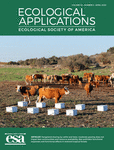
ECOLOGICAL APPLICATIONS
Connecting research to conservation for impactful change.ECOLOGICAL APPLICATIONS, published by WILEY, is a leading journal in the field of ecology, providing a platform for innovative research that addresses the understanding and management of ecological systems. With an ISSN of 1051-0761 and E-ISSN of 1939-5582, it has established itself as a vital resource for ecologists and environmental scientists since its inception in 1991. Ranked in the top quartile (Q1) for Ecology in 2023 and with a Scopus ranking of 40 out of 461 in Environmental Science, ECOLOGICAL APPLICATIONS boasts an impressive impact factor, attesting to its significance and influence in the field. The journal's mission is to publish peer-reviewed articles that contribute to ecological theory and its applications in conservation and environmental management. Researchers, professionals, and students alike will find invaluable insights and the latest developments in ecological research through its comprehensive scope and rigorous scholarship, ensuring a crucial role in shaping future ecological practices and policies.
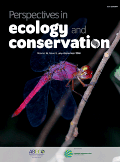
Perspectives in Ecology and Conservation
Exploring critical perspectives in ecology and environmental management.Perspectives in Ecology and Conservation, published by Elsevier Science Ltd, is a leading academic journal dedicated to advancing the fields of ecology, conservation, and environmental management. With a Q1 ranking in multiple categories, including Ecology, Management, Monitoring, Policy and Law, and Nature and Landscape Conservation, this journal boasts an impressive standing among its peers, making it essential reading for researchers and professionals. Since its inception in 2017 and running through 2024, it aims to provide innovative perspectives and critical analyses that enhance our understanding and practices in conservation science. The journal is accessible through open access options, facilitating broader dissemination of knowledge. Its commitment to addressing contemporary ecological challenges reinforces its importance in the academic community, promoting sustainable practices and informed policy-making in the face of urgent environmental issues.

Global Ecology and Conservation
Advancing ecological knowledge for a sustainable future.Global Ecology and Conservation, published by Elsevier, stands as a premier open-access journal dedicated to advancing the field of ecology and conservation science. Since its inception in 2014, the journal has facilitated the dissemination of high-quality research, fostering critical dialogue on ecosystem management, biodiversity preservation, and sustainability practices across the globe. With a remarkable ranking within the top quartiles (Q1) in various categories including Ecology, Evolution, Behavior and Systematics, and Nature and Landscape Conservation, it is positioned among the leading resources for researchers and professionals alike. The journal has garnered a notable impact, ranking #65 out of 721 in Ecology, and houses articles that are vital to understanding and addressing the pressing environmental challenges of our time. Available in an open-access format, researchers can freely access and share vital findings, promoting a collaborative approach to ecological research. Global Ecology and Conservation is not just a publication; it is a critical tool for innovation and advocacy in conservation, poised to inspire the next generation of environmental stewards.

Frontiers in Conservation Science
Empowering Research to Protect Our Natural HeritageFrontiers in Conservation Science, published by Frontiers Media SA in Switzerland, is an esteemed open-access journal dedicated to advancing research in the field of conservation science. With an E-ISSN of 2673-611X, this journal aims to facilitate the exchange of knowledge among researchers, professionals, and students by publishing high-quality, peer-reviewed articles that explore innovative solutions to contemporary conservation challenges. Since its establishment in 2020, the journal has rapidly ascended to a Q2 ranking in the Nature and Landscape Conservation category, reflecting its commitment to impactful scholarship, as evidenced by its Scopus rank of #93 out of 211 in Environmental Science and a 56th percentile ranking. By promoting open access, Frontiers in Conservation Science ensures that vital research is widely disseminated, fostering collaboration and informed decision-making in the conservation community. This journal is a crucial platform for those dedicated to understanding and preserving our planet's biodiversity and landscapes.

AMPHIBIAN & REPTILE CONSERVATION
Empowering Conservationists with Open Access KnowledgeAMPHIBIAN & REPTILE CONSERVATION, published by the Amphibian Conservation Research Center & Lab, is a leading journal dedicated to the field of herpetology and environmental conservation. With an ISSN of 1083-446X and an E-ISSN of 1525-9153, this journal serves as a vital resource for researchers, conservationists, and students interested in the preservation of amphibian and reptile species. The journal has achieved remarkable rankings, categorized in the Q2 quartile for Animal Science and Zoology, Ecology, and Nature and Landscape Conservation as of 2023, reflecting its significant contribution to the scientific community. Over the converged years from 2016 to 2024, the journal has established itself as an integral platform for disseminating research findings, fostering collaboration, and enhancing the understanding of biodiversity and ecosystem dynamics. By embracing an open-access approach, AMPHIBIAN & REPTILE CONSERVATION ensures that critical research is readily available to a global audience, promoting informed conservation efforts and policy advocacy to safeguard these vital species amidst their declining populations.
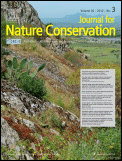
JOURNAL FOR NATURE CONSERVATION
Pioneering Solutions for Environmental ChallengesJOURNAL FOR NATURE CONSERVATION, published by Elsevier GmbH, serves as a pivotal platform for the dissemination of applied and theoretical research in the fields of ecology, nature, and landscape conservation. With an ISSN of 1617-1381 and an E-ISSN of 1618-1093, this esteemed journal has earned a notable reputation, ranking in the Q2 category for both Ecology and Nature and Landscape Conservation in 2023. It is indexed in Scopus with commendable rankings, including #67/211 in Environmental Science - Nature and Landscape Conservation, highlighting its significance within the academic community. The journal’s diverse scope captures the complexities of environmental challenges and offers insights beneficial to researchers, conservationists, and policymakers dedicated to preserving biodiversity and facilitating sustainable practices. Situated in Munich, Germany, the journal has continuously contributed valuable knowledge since its inception in 1991, making it an essential resource for those committed to advancing conservation efforts on a global scale.